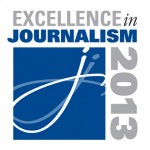EIJ13: Kai Ryssdal: Making Important Economics Reporting Fun and Engaging
 “According to its host and senior editor, American Public Media’s Marketplace isn’t meant for hardcore business news junkies. Or at least, not exclusively.
“According to its host and senior editor, American Public Media’s Marketplace isn’t meant for hardcore business news junkies. Or at least, not exclusively.
Kai Ryssdal told attendees of Aug. 24’s Super Session at the Society of Professional Journalists’ Excellence in Journalism 2013 convention in Anaheim, California, that the show’s irreverent style of is an intentional effort to be accessible to everyone from his mom and to Wall Street traders.
“I am not the expert. I know a lot about business and the economy now,” he said. But, “as soon as a journalist begins to think he or she is the expert, he is lost. … On a very good day at Marketplace, I am the listener’s proxy.”
Making a show that’s informative for both the general public and Wall Street traders means letting reporters take some liberties with the sometimes-staid public radio formula.
“We want our reporters to go bananas,” said Ryssdal (his name is Norwegian). “They can do what they have to do to tell the story.”
Ryssdal has been known to enforce that accessibility by threatening to kill the microphone for sources who use too much jargon and minutiae on the air.
“The opportunity we have to take these intensely complicated things to make them relatable … it’s a great gig.”
Part of the secret to making business and economics news engaging is not thinking of the stories that way.
“We don’t care about what the Dow does every day,” he said. “It’s a lens for talking about things that matter.”
Although there are some stories that are hard for them to view through that lens — the ongoing Syrian conflict, for instance — it’s usually not a problem.
Among the stories he thinks needs more business coverage: “political dysfunction in Washington.”
Ryssdal didn’t set out to be a journalist. After serving in the Navy and Foreign Service, he and his wife decided to make some changes in their lives, she more successfully than he did. Every business school that she applied to but one accepted Ryssdal’s wife, but none of the law schools he applied to accepted him. So while she began pursuing a degree, he got a minimum wage job at Borders Books.
While shelving a book on internships, he found the info on local NPR station KQED and called them up. The first time he heard his audio and copy read on the air, he was hooked.
“Do what you love,” he said. “It took me two careers and 13 years to find what I loved.”
Still, he counts his military and diplomatic experience as invaluable, both for making him “the most disciplined person in public radio, full stop,” but also for expanding his horizons: “There are things you only learn about this country by leaving this country.”
Since 2005, he’s served as the senior editor and host of Marketplace, which is produced out of Los Angeles. (Its original investor was based out of Long Beach.)
That West Coast perspective gives the show some helpful distance from the major markets and centers of power, he said: “We are not of the Washington ecosphere. We are not of the Wall Street ecosphere.”
Marketplace has 15 full time reporters for all four of its shows, although about 60 percent of their stories come from partner stations.
The show also partners with other newsrooms, including Pro Publica: “Nobody has the resources to do any one project, all in all, by themselves any more.”
Although he’s cautious about the future of journalism — if journalism was a stock, he’d give it a “hold” signal — he sums up his view of it in five words, a standard question for CEOs on his program: “Scary. Promising. Essential. Dynamic. Worthwhile. Boom!””
A Twitter enthusiast — Ryssdal checked Twitter three times in 10 minutes before Saturday’s panel — it’s his only social network.
“I absorb a lot through Twitter,” he said.
Ryasdal tweets personal things, interesting things, and things intended to provoke a response from his 33,000 followers.
But he allows no phones at the dinner table, though.
Embracing the digital future isn’t optional for journalists, in Ryssdal’s mind.
“For journalists today, if you’re not thinking digital, multi-platform, you’re doing it wrong, and you’re doomed,” he said.
And despite journalism’s uncertain future, it’s still vitally important, he told the ballroom full of journalists Saturday night.
“If we, as a society, begin feeling that one person doesn’t matter, then we’re lost,” Ryssdal said. “If you don’t feel you can make a difference, how do you get up in the morning?”
No Comments »
No comments yet.
RSS feed for comments on this post.
Leave a comment
Line and paragraph breaks automatic, e-mail address never displayed, HTML allowed: <a href="" title=""> <abbr title=""> <acronym title=""> <b> <blockquote cite=""> <cite> <code> <del datetime=""> <em> <i> <q cite=""> <s> <strike> <strong>
